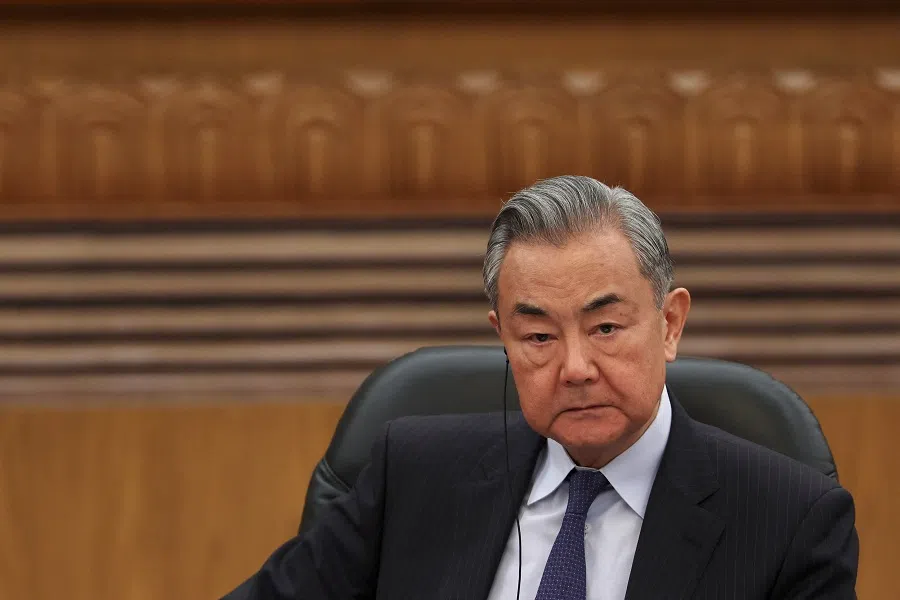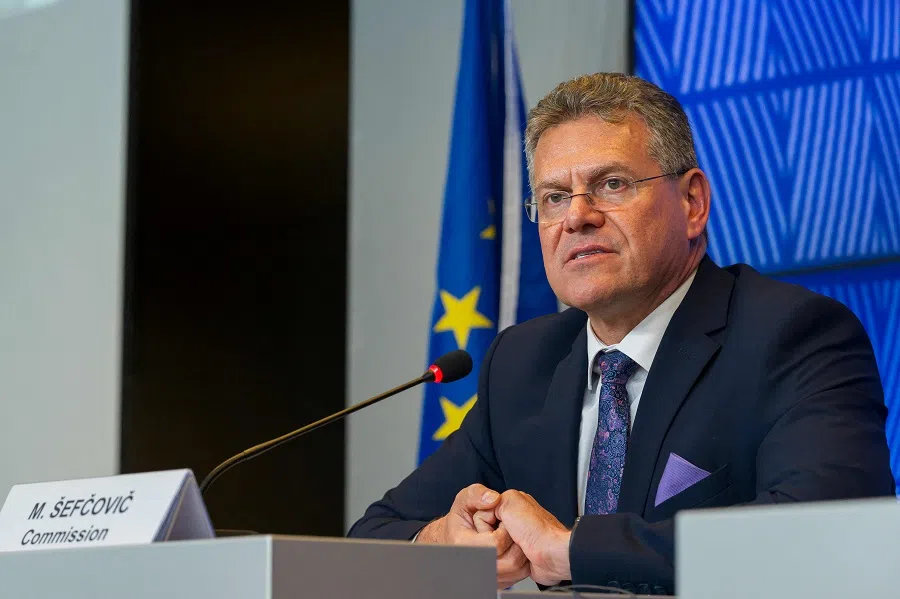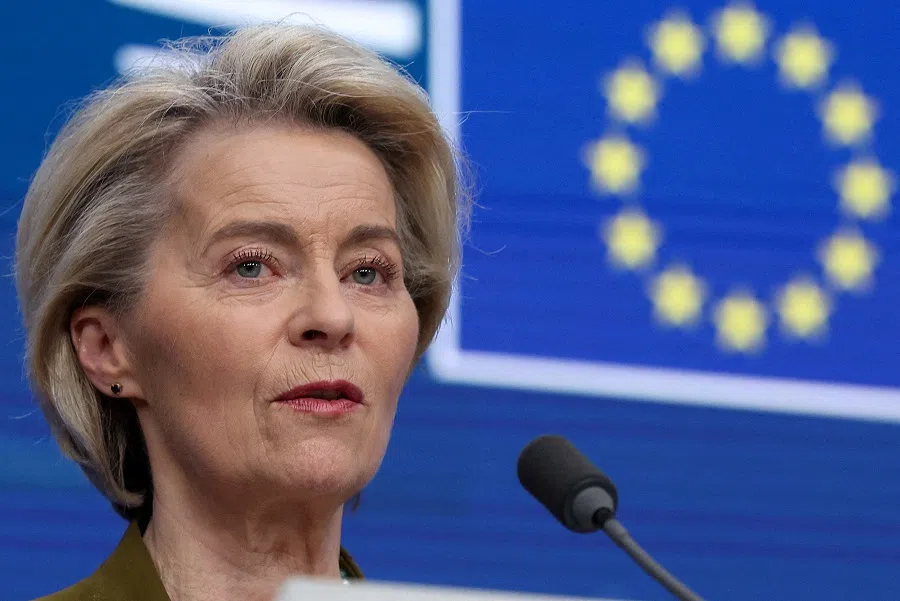Trump’s tariffs: A catalyst for EU-China cooperation?
Rebalancing ties between Moscow and Kyiv can burnish China’s credentials as a neutral broker in the eyes of the European bloc and, accordingly, pave the way for a reset of the Sino-European relationship amid Trump’s tariffs, says Italian commentator Emanuele Scimia.

It seems China is recalibrating its approach to the Russia-Ukraine war. If so, it is more likely that Beijing can strike an entente with Europe to cooperate against US President Donald Trump’s disruptive tariffs policy, which has hit both sides heavily.
In recent times, European allegations of unfair trade practices by Chinese companies and of China of helping Moscow weather Western sanctions after the Russian invasion of Ukraine have led to the tumbling of EU-China relations.
Steady economic exchanges between Beijing and Moscow have so far given the Russian side a lifeline against multiple penalties levelled by the US, Europe and their allies. But the European bloc is likely hoping that the fall in trade turnover between China and Russia in the first two months of the new year reflects a change of policy in Beijing, and not just a simple commercial adjustment.
China has been talking about helping with the reconstruction of Ukraine as far back as its 12-point-peace plan, but the EU has always seen Beijing’s peace proposal as inconsistent, if not a smokescreen for covering Russia’s assault.
A sea change in Chinese policy?
In this regard, a recent development should turn European leaders more upbeat. On 4 April, Ukrainian railway operator Ukrzaliznytsia revealed that in January it had finalised two contracts with Chinese rail manufacturers to restore and develop the Ukrainian rail system.

China has been talking about helping with the reconstruction of Ukraine as far back as its 12-point-peace plan, but the EU has always seen Beijing’s peace proposal as inconsistent, if not a smokescreen for covering Russia’s assault.
The supply of rail to Kyiv is China’s first, concrete step to support reconstruction of the war-torn country, which can only gain traction with a durable peace. The development is very significant, as railways have military value and the Ukrainians use them to move troops and weaponry to the frontline. Europe can cheer Beijing’s move, while the Russians cannot but be irritated by it.
Chinese Foreign Minister Wang Yi reiterated on 1 April that China was ready to play a “constructive role” in securing an end to the war in Ukraine. Beijing has proposed itself as an impartial mediator despite its “no limits” partnership with the Kremlin.
Europe’s balancing act
Rebalancing ties between Moscow and Kyiv can burnish China’s credentials as a neutral broker in the eyes of the European bloc and, accordingly, pave the way for a reset of the Sino-European relationship.
Since he started his second mandate in January, Trump has been busy ripping the EU and China apart. So no wonder Beijing and the Europeans have started deepening dialogue after years of tensions.
Then the Chinese commerce ministry announced on 2 April that it would extend by three months an anti-dumping probe into brandy imported by the EU.

On 7 March, Wang said at a press conference on the sidelines of China’s annual parliamentary session that major powers (a euphemism for the US) “should not bully the weak” and that China considered Europe a “trusted partner”.
A couple of days before, at the same venue, China’s special envoy for European affairs Lu Shaye had said that Trump’s treatment of his European allies was “appalling”.
Then the Chinese commerce ministry announced on 2 April that it would extend by three months an anti-dumping probe into brandy imported by the EU. Beijing had launched the investigation in response to the EU’s anti-subsidy tariffs on China-made electric vehicles and its extension would give the parties more time to negotiate.
Europe will actually do everything possible to get a deal with Trump on defence, the Ukraine war and trade levies. It is not by chance that the EU endorsed tough language on China’s “military build-up” and “coercion” towards Taiwan and in the South China Sea in two recent statements released by foreign ministers from the G7 (the group of seven major advanced economies).
For the moment, Trump has not been receptive to European overtures. In exchange for a deal on tariffs, EU Commissioner for Trade and Economic Security Maros Sefcovic reportedly offered cooperation to tackle what Europe and America see as distortive effects on international trade of China’s industrial overcapacity.
Trump nipped Sefcovic’s detente initiative in the bud, and the EU trade tsar wasted no time engaging with the Chinese in Beijing at the end of March.

Trump nipped Sefcovic’s detente initiative in the bud, and the EU trade tsar wasted no time engaging with the Chinese in Beijing at the end of March. As a result, the two sides agreed to resume negotiations to solve the dispute on Chinese electric cars.
Unfolding drama
Europe and China are both commercial powerhouses and their re-engagement could attract other actors into a “coalition of willing” to keep global demand strong and prevent a devastating recession. It is safe to assume that the Association of Southeast Asian Nations (ASEAN) and the Anglosphere (Britain, Canada, Australia and New Zealand), as well as India, Japan and South Korea would also benefit from it.
In Trump’s new world order, the US president may be following former presidential adviser Henry Kissinger’s maxim that America should not counter China and Russia at once, trying to “peel off” Moscow from Beijing by granting Russian President Vladimir Putin some gains in Ukraine.
China cannot afford to imperil commercial exchanges with the EU amid Trump’s tariffs storm and courting of Putin. Equally, the bloc cannot manage the US security disengagement from Europe plus the US president’s duties, and at the same time fight a revisionist Russia at its eastern flank and challenge China’s market distortions.
Geopolitical voids are inevitably filled, and China can fill those left in Europe by America, at least until a new, more cooperative commander-in-chief comes to the White House.
Geopolitical voids are inevitably filled, and China can fill those left in Europe by America, at least until a new, more cooperative commander-in-chief comes to the White House. After all, even the US’s strongest allies in the Indo-Pacific, Japan and South Korea, are looking to heal rifts with Beijing in a likely hedge against Trump’s unpredictability.

The EU expects Trump to change course. European Commission President Ursula von der Leyen welcomed Thursday’s announcement by Trump to pause reciprocal tariffs against the EU (and a number of countries) for 90 days and said the bloc remained committed to constructive negotiations with Washington.
Trump tariffs pushing EU closer to China
However, she also emphasised that “at the same time, Europe continues to focus on diversifying its trade partnerships, engaging with countries that account for 87% of global trade”. Simply put, von der Leyen signalled that the EU will continue to dialogue with Beijing, and that Trump’s stop-and-go tariffs policy cannot give any guarantees.
On the other hand, the US president’s decision to increase duties on Chinese imports to 125% from the previous 104% level can do nothing but push China to accelerate rapprochement with Europe. In this context, other Chinese economic operations in Ukraine, such as the sale of rails for its reconstruction, would be a strong incentive for a renovated Sino-European cooperation.
Von der Leyen said the EU wants to achieve a mutually acceptable deal with Trump on tariffs. Otherwise, if China and the EU find common ground on a fair peace in Ukraine and keeping world markets open, Europe can really shelve de-risking from Beijing while focusing on reducing dependence on Trumpian America.





![[Big read] When the Arctic opens, what happens to Singapore?](https://cassette.sphdigital.com.sg/image/thinkchina/da65edebca34645c711c55e83e9877109b3c53847ebb1305573974651df1d13a)